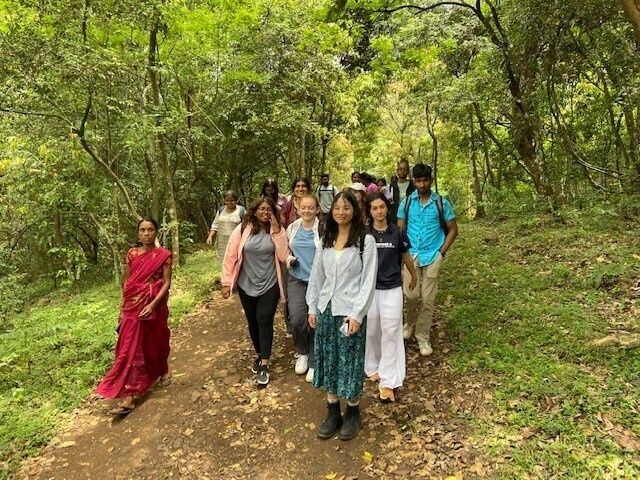South Asia Program
Rohit Lamba

Assistant Professor, Economics
Geographic Research Area: India
Teaching/Research Interest: Applied Economics & Policy, International Development, Economic Theory
Additional Information
US TikTok Ban Could Echo India Chaos as Users Seek Options

Aditya Vashistha, SAP
“The impact on the micro-influencers and the mid-tier influencers is going to be much stronger. I see similar ripple effects both in the U.S. and in India,” says Aditya Vashistha, assistant professor of information science.
Additional Information
Bangla Conversation Hour

April 30, 2025
3:30 pm
Stimson Hall, G25
Come to the LRC to practice your language skills and meet new people. Conversation Hours provide an opportunity to use the target language in an informal, low-pressure atmosphere. Have fun practicing a language you are learning! Gain confidence through experience! Just using your new language skills helps you learn more than you might think. Conversation Hours are open to any learner, including the public.
Additional Information
Program
South Asia Program
Ware Rotary Award for International Graduate Professional Development

Details
International students: Do you plan to travel to a U.S. conference or networking event related to your field of study?
The W. Barlow Ware Rotary Award for International Graduate Student Professional Development provides three awards annually to international graduate and professional students at Cornell. The awards ($650 maximum) support domestic travel and attendance costs for conferences or professional events promoting international graduate students' professional development.
Amount
Up to $650. Award recipients will have funds directly deposited through the Cornell Bursar system. Per U.S. Internal Revenue Service guidelines, 14% of the funds may be withheld for tax purposes.
Eligibility
Graduate students and students enrolled in Cornell’s professional schools are eligible. In addition, you must be:
- An international student with citizenship outside the United States (nonresident on a Cornell-sponsored student visa)
- Actively engaged with the Mario Einaudi Center for International Studies or one of our regional and thematic programs
Requirements
- In your application, you must clearly explain the value of your proposed conference or networking experience—as well as the alignment of your research or professional studies—with one or more of the Seven Rotary Causes:
- Promoting peace
- Fighting disease
- Providing clean water, sanitation, and hygiene
- Saving mothers and children
- Supporting education
- Growing local economies
- Protecting the environment
- Ware Rotary awards support domestic airfare or train/bus, hotel, and other associated costs for attendance at an event directly related to your dissertation, thesis research, or planned professional career.
- The proposed conference, meeting, or event must be held in the United States, with your travel beginning and ending in the U.S.
- You must attend the conference or event described in your application. Awards are not transferable.
- Travel must take place between March 1 and August 15, 2025, and cannot be funded retroactively.
Reporting
Post-event reporting is mandatory for all award recipients. By applying, you agree to complete the following reporting no later than August 29, 2025:
- Provide proof of event attendance, such as a registration email and a copy of the conference program.
- Provide a testimonial stating how your attendance benefited your professional development and promoted one or more of the Seven Rotary Causes.
- Photos of you attending your event are appreciated! Please sign this multimedia release before submitting photos.
Questions?
Additional Information
Funding Type
- Award
Role
- Student
Program
Information Session: Einaudi Center Undergraduate Opportunities

March 11, 2025
5:00 pm
Uris Hall, G08
Join us to learn about opportunities for undergraduate students with the Einaudi Center for International Studies! This session will discuss how to successfully apply for programs like Global Internships and Laidlaw Scholars, and how to discover or strengthen global interests, including academic minors, weekly seminars, and language study.
Can't attend? Email programs@einaudi.cornell.edu for more information.
Additional Information
Program
Einaudi Center for International Studies
Reppy Institute for Peace and Conflict Studies
East Asia Program
Southeast Asia Program
Latin American and Caribbean Studies
Institute for European Studies
South Asia Program
Migrations Program
Information Session: IES & PACS Undergrad and Grad Opportunities

February 18, 2025
3:00 pm
Uris Hall, G08
This session will describe opportunties for undergraduate and graduate students in the Institute for European Studies and the Reppy Institute for Peace and Conflict Studies.
IES offers a minor in European Studies, Global Summer Internships, a Graduate Fellows Program, and research funding for both undergraduate and graduate students. PACS offers fellowships, funding, and research travel grants for undergraduate and graduate students.
Register for virtual attendance here. Can't attend? Contact ies@cornell.edu or pacs@cornell.edu.
Additional Information
Program
Einaudi Center for International Studies
Reppy Institute for Peace and Conflict Studies
East Asia Program
Southeast Asia Program
Latin American and Caribbean Studies
Institute for African Development
Institute for European Studies
South Asia Program
Migrations Program
Information Session: Fulbright U.S. Student Program for Undergraduates

March 19, 2025
4:45 pm
The Fulbright U.S. Student Program supports U.S. citizens to study, conduct research in any field, or teach English in more than 150 countries. Students who wish to begin the program immediately after graduation are encouraged to start the process in their junior year. Recent graduates are welcome to apply through Cornell.
The Fulbright program at Cornell is administered by the Einaudi Center for International studies. Applicants are supported through all stages of the application and are encouraged to start early by contacting fulbright@einaudi.cornell.edu.
Register here. Can't attend? Contact fulbright@einaudi.cornell.edu.
Additional Information
Program
Einaudi Center for International Studies
Reppy Institute for Peace and Conflict Studies
East Asia Program
Southeast Asia Program
Latin American and Caribbean Studies
Institute for African Development
Institute for European Studies
South Asia Program
Migrations Program
Information Session: Fulbright Opportunities for Graduate Students

March 5, 2025
4:45 pm
The Fulbright U.S. Student Program provides full funding for graduate and professional students conducting research in any field or teaching in more than 150 countries. Open to U.S. citizens only. The Fulbright-Hays Doctoral Dissertation Research Abroad program supports doctoral students conducting research in modern languages or area studies for six to 12 months.
Open to U.S. citizens and permanent residents of the United States. Travel to Western European countries is not eligible.
Register here. Can’t attend? Contact fulbright@einaudi.cornell.edu.
Additional Information
Program
Einaudi Center for International Studies
Reppy Institute for Peace and Conflict Studies
East Asia Program
Southeast Asia Program
Latin American and Caribbean Studies
Institute for African Development
Institute for European Studies
South Asia Program
Migrations Program
Summer Program in India Info Session

February 12, 2025
5:30 pm
Uris Hall, G24
Are you interested in the intersection of mental health and culture, global health, and community engagement? Do you want to gain field research skills and learn about indigenous communities in South India’s beautiful and fragile Nilgiris Biosphere Reserve? If so, the Cornell-Keystone Nilgiris Field Learning Program might be for you!
Additional Information
Program
Einaudi Center for International Studies
South Asia Program
Worrying ‘Fine Print’ of Growth Story: Economist Kaushik Basu's Take on India's Economy

Kaushik Basu, SAP
Kaushik Basu, professor of economics, talks about India’s growth rate at the Ramakrishna Mission Institute of Culture.
